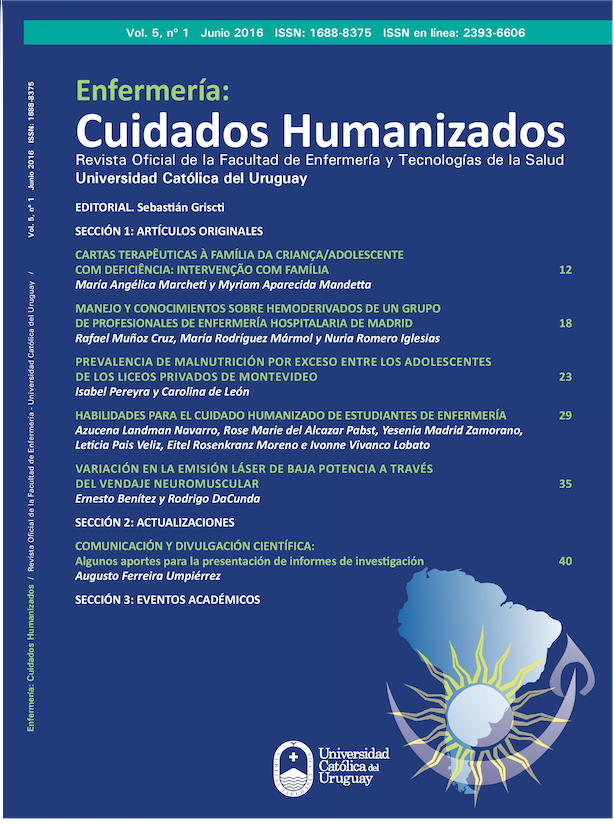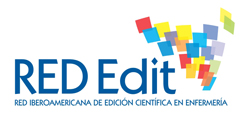THERAPEUTIC LETTERS TO THE FAMILY OF A DISABLED CHILD/ADOLESCENT: INTERVENTION WITH FAMILY
DOI:
https://doi.org/10.22235/ech.v5i1.1187Keywords:
family nursing, disabled children nursing care, familyAbstract
The main goal of this study was to understand the meaning given by the disabled child’s family to the therapeutic letters that they received during their participation in the Intervention
Program with Mental Disabled Child’s Families (PIFCDM). Data collection was conducted in May 2010 interviewing six families. The qualitative analysis of content, according to Morse, led the
research. The category of “being a reference to the family” expresses the meaning of the therapeutic letters to the families. This is a new experience for the families, who were pleasantly surprised, allowing the awakening of positive feelings and considerations to their history. Reading the letters widens the understanding of the situation experienced, enabling the
family to modify the way that they handle the situations, giving rise to a sense of empowerment of their capabilities in their history with the disabled child. The therapeutic letters showed that they can be valuable interventions in the disabled child’s family care.
Downloads
References
Levorlino SA. Estudo das percepções, sentimentos e concepções para entender o luto de familiares de portadores da síndrome de Down da cidade de Sobral – Ceará. [Tese de Doutorado]. São Paulo (SP): Faculdade de Saúde Pública da Universidade de São Paulo; 2005.
Leal EN. A criança com síndrome de Down: expectativa da família quanto ao processo de inclusão escolar. [Dissertação]. Ribeirão Preto (SP): Faculdade de Filosofia Ciências e Letras de Ribeirão Preto da Universidade de São Paulo; 2006.
Franco V, Apolónio AM. Desenvolvimento, resiliência e necessidades das famílias com crianças deficientes. Revista Ciência Psicológica. 2002; 8:40-54.
Holanda ER, Collet N, Costa SFG da. Crianças com Síndrome de Down: o significado do cuidar na percepção de mães. Online Brazilian Journal of Nursing [Internet]. 2008 [Acesso em: 09 ago 2010]; 7(2).
Disponível em: http://www.objnursing.uff.br/index.php/nursing/article/view/j.1676-4285.2008.1443/347
Barbosa MAM, Chaud MN, Gomes MMF. [Vivências de mães com um filho deficiente: um estudo fenomenológico]. Acta Paul Enfermagem 2008; 21(1):46‑52.
Barbosa MAM, Pettengill MAM, Farias TL, Lemos LC. Cuidado da criança com deficiência: Suporte social acessado pelas mães. Rev Gaúcha Enferm. 2009; 30(3):406-12.
Wright LM, Leahey M. Enfermeiras e Famílias: um guia para avaliação e intervenção na família. 5ª Ed. São Paulo: Roca; 2012.
Wright LM, Simpson P. A systemic belief approach to epileptic seizures: a case of being spellbound. Contemporary Family Therapy: An International Journal. 1991; 13(2): 165-80.
Wright LM, Watson WL. Systemic family therapy and family development. In: Falicov CJ. Family transitions: Continuity and change over the life cycle. New York: Guilford; 1988.
Wright LM, Watson WL, Bell JM. Beliefs: The heart of healing in families and illness. New York: Basic Books; 1996.
Levac AM, McLean S, Wright LM, Bell JM, “Ann, & Fred. A Reader’s Theatre” intervention to managing grief: Post-therapy reflections by a family and a clinical team. Journal of Marital and Family Therapy. 1998; 24(1): 81-94.
Moules NJ. Nursing on paper: The art and mystery of therapeutic letters in clinical work with families experiencing illness [Unpublished doctoral thesis]. Alberta (Canada): University of Calgary; 2000.
Moules NJ. Nursing on paper: Therapeutic letters in nursing practice. Nursing Inquiry. 2002; 9(2): 104-13.
Moules NJ. Therapy on paper: Therapeutic letters and the tone of relationship. Journal of Systemic Therapies. 2003; 22(1): 33-49.
Moules NJ. Therapeutic letters in nursing: Examining the
character and influence of the written word in clinical work with families experiencing illness. Journal of Family Nursing. 2009; 15(1): 31-49.
Moules NJ, Thirsk LM, Bell JM. A Christmas without memories: Beliefs about grief and mothering – A clinical case analysis. Journal of Family Nursing. 2006; 12(4):426-41.
Morse JM, Field PA. Qualitative research methods for health professionals. 2ª ed. Thousand Oaks: Sage; 1995.
Pyle RN. Therapeutic letters as relationally responsive practice. Journal of Family Nusing. 2009; 15(1): 65-82.
Rodgers N. Therapeutic letters: a challenge to conventional notions of boundary. Journal of Family Nursing. 2009; 15(1):50-64.
Bell JM, Moules NJ, Wright LM. Therapeutic letters and the Family Nursing Unit: a legacy of advanced nursing practice. Journal of Family Nursing. 2009; 15(1):6‑30.
Moules NJ. The past and future of therapeutic letters: family suffering and healing words. Journal of Family Nursing. 2009; 15(1): 102-11.
Mamede MC. Cartas e retratos: uma clínica em direção à ética. [Tese de Doutorado]. São Paulo (SP): Universidade de São Paulo. Instituto de Psicologia; 2002.
Marcheti MA. (2012). Programa de intervenção na família no contexto da deficiência mental: um espaço para promover mudanças. Tese (Doutorado) – Escola Paulista de Enfermagem da Universidade Federal de São Paulo, São Paulo.
Pettengill MAM, Angelo M. Vulnerabilidade da família: desenvolvimento do conceito. Rev Latino-am Enfermagem. 2005; 13(6): 982-8.
Walsh F. (2005). Fortalecendo a Resiliência Familiar. São
Paulo: Roca.
Downloads
Published
How to Cite
Issue
Section
License
Copyright (c) 2016 Enfermería: Cuidados Humanizados

This work is licensed under a Creative Commons Attribution 4.0 International License.

















